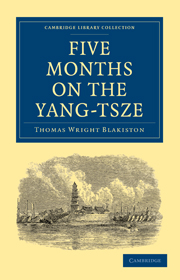 Five Months on the Yang-Tsze
Five Months on the Yang-Tsze Book contents
- Frontmatter
- PREFACE
- Contents
- LIST OF ILLUSTRATIONS
- CHAPTER I UP TO NANKING
- CHAPTER II THE MING TOMBS
- CHAPTER III THE TAIPINGS AT THEIR CAPITAL
- CHAPTER IV A NAVAL SQUADRON INLAND
- CHAPTER V ADMIRAL HOPE'S EXPLORATION
- CHAPTER VI JUNK TRAVELLING IN HOO-PEH
- CHAPTER VII SHI-SHOW TO I-CHANG
- CHAPTER VIII GORGES AND RAPIDS
- CHAPTER IX EASTERN SZ'CHUAN
- CHAPTER X VISITS AND CEREMONIES
- CHAPTER XI THE GOLD-SAND RIVER
- CHAPTER XII CROSS RANGES
- CHAPTER XIII CHUNG-KING
- CHAPTER XIV THE FOUR VALLEYS
- CHAPTER XV SÜ-CHOW AND THE WESTERN REBELS
- CHAPTER XVI PING-SHAN — OUR FARTHEST
- CHAPTER XVII THE UPPER YANG-TSZE
- CHAPTER XVIII DOWN THE KIN-CHA KIANG
- CHAPTER XIX RETURN FROM THE INTERIOR
- APPENDIX
CHAPTER XIII - CHUNG-KING
Published online by Cambridge University Press: 28 April 2011
- Frontmatter
- PREFACE
- Contents
- LIST OF ILLUSTRATIONS
- CHAPTER I UP TO NANKING
- CHAPTER II THE MING TOMBS
- CHAPTER III THE TAIPINGS AT THEIR CAPITAL
- CHAPTER IV A NAVAL SQUADRON INLAND
- CHAPTER V ADMIRAL HOPE'S EXPLORATION
- CHAPTER VI JUNK TRAVELLING IN HOO-PEH
- CHAPTER VII SHI-SHOW TO I-CHANG
- CHAPTER VIII GORGES AND RAPIDS
- CHAPTER IX EASTERN SZ'CHUAN
- CHAPTER X VISITS AND CEREMONIES
- CHAPTER XI THE GOLD-SAND RIVER
- CHAPTER XII CROSS RANGES
- CHAPTER XIII CHUNG-KING
- CHAPTER XIV THE FOUR VALLEYS
- CHAPTER XV SÜ-CHOW AND THE WESTERN REBELS
- CHAPTER XVI PING-SHAN — OUR FARTHEST
- CHAPTER XVII THE UPPER YANG-TSZE
- CHAPTER XVIII DOWN THE KIN-CHA KIANG
- CHAPTER XIX RETURN FROM THE INTERIOR
- APPENDIX
Summary
Second only to Ching-tu in a political way, Chung-king is the most important place in the province of Sz'chuan, while as a trading mart it stands on an equality with the largest cities of the empire; and situated as it is in the centre of the most populous and thriving part of that fertile province, and at a point on the greatest highway of China whence radiate rivers and other means of communication towards all parts of the country, it enjoys an enormous amount of mercantile business. Hence converge all the products of Sz'chuan, to be distributed in various directions; and through it must pass all the imports to supply the demands of this populous province. It is in the west of China what Hankow is of the centre, Shanghai of the coast, and Canton of the south; within its walls northern and southern productions, as well as eastern and western, interchange.
Chung-king is composed of two walled cities, each of the first order, Chung-king (foo) and Li-min (foo); the former on the left, and the latter on the right, bank of the river Ho-tow, at its junction with the Yang-tsze. The present population, from reports of the Roman Catholic missionaries, is about 200,000, of whom between two and three thousand are Christians, besides 500 Mussulman families; but I find it stated in a French translation of a Chinese geographical account of Sz'chuan, that the number of inhabitants at the commencement of the present dynasty was not quite thirty six thousand.
- Type
- Chapter
- Information
- Five Months on the Yang-TszeWith a Narrative of the Exploration of its Upper Waters and Notices of the Present Rebellions in China, pp. 211 - 230Publisher: Cambridge University PressPrint publication year: 2010First published in: 1862


